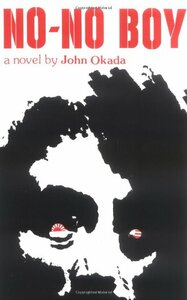Take a photo of a barcode or cover
This is flat out a masterpiece of American literature. It's super short too - highly recommended read.
Why is it that, in my freedom, I feel more imprisoned in the wrongness of myself and the thing I did than when I was in prison?
A really complex and compelling novel about a young Japanese-American man trying to negotiate his re-entry into society after being imprisoned for refusimg to serve in WWII, and also refusing to pledge allegiance to America. A no-no boy. There are different reactions within and without his community; his proud mother who was the propelling force behind his decision, his bitter and angry little brother, another no-no boy, other Japanese-Americans who did serve and returned, maimed and unscathed both. There's a lot of striking language and observations about race, class, the yearning to be American in an America that despises you, all while Ichiro grapples with his decision, whether or not he regrets it, and what it means for him to have to live with that choice. It's a very feelingly written book. It lost me a couple times; had a tendency to sort of meander after itself sometimes, and the writing could have used a polish. But it was definitely a really insightful read, with some really great passages about identity and anger and family. Enjoyed it a good deal.
A really complex and compelling novel about a young Japanese-American man trying to negotiate his re-entry into society after being imprisoned for refusimg to serve in WWII, and also refusing to pledge allegiance to America. A no-no boy. There are different reactions within and without his community; his proud mother who was the propelling force behind his decision, his bitter and angry little brother, another no-no boy, other Japanese-Americans who did serve and returned, maimed and unscathed both. There's a lot of striking language and observations about race, class, the yearning to be American in an America that despises you, all while Ichiro grapples with his decision, whether or not he regrets it, and what it means for him to have to live with that choice. It's a very feelingly written book. It lost me a couple times; had a tendency to sort of meander after itself sometimes, and the writing could have used a polish. But it was definitely a really insightful read, with some really great passages about identity and anger and family. Enjoyed it a good deal.
“But I did not love enough, for you were still half my mother and I was thereby still half Japanese and when the war came and they told me to fight for America, I was not strong enough to fight you and I was not strong enough to fight the bitterness which made the half of me which was you bigger than the half of me which was America and really the whole of me that I could not see or feel. Now that I know the truth when it is too late and the half of me which was you is no longer there, I am only half of me and the half that remains is American by law because the government was wise and strong enough to know why it was that I could not fight for America and did not strip me of my birthright.”
I wish our president would read this novel.
I wish our president would read this novel.
challenging
dark
sad
slow-paced
Plot or Character Driven:
Character
Strong character development:
Yes
Loveable characters:
Complicated
Diverse cast of characters:
Yes
Flaws of characters a main focus:
Yes

"Why is it that in my freedom, I feel more imprisoned in the wrongness of myself and the thing I did than when I was in prison? Am I never really to know again what it is to be American? If there should be an answer, what is it? What penalty is it that I must pay to justify my living as I so fervently desire to? There is, I am afraid, no answer. There is no retribution for one who is guilty of treason, and that is what I am guilty of. The fortunate get shot. I must live my punishment."
[b: No-No Boy|129910|No-No Boy|John Okada|https://i.gr-assets.com/images/S/compressed.photo.goodreads.com/books/1567070869l/129910._SY75_.jpg|384334] wrecks my soul. It moves me in a way that no other class-required text has ever done. This book is not at all what I expected. I thought I was going into a story about a man totally confident in his decisions; a righteous resistance against the actions of the American government during Japanese internment.
No, no this isn't that kind of book at all. This is a story about a tortured man who views himself as unworthy of redemption; a man who must face against the world he denounced, believing himself to be a worthless burden. Ichiro is not a very likable protagonist. He's unjustifiably cruel at times, holding such a pessimistic attitude. Yet, when viewing the world through his perspective, it's not difficult to understand the source of his untamable anger. Ichiro shifts aimlessly between two identities actively hostile towards him. As an American, Ichiro is regarded as a traitor, a low-life unwilling to follow national orders. As a Japanese person, his community holds intense resentment, furious at his refusal to comply with the model-minority archetypes that have stabilized their lives.
Calling Ichiro a complex character is the understatement of the year. His haunting soliloquies invade your mind. It's going to take me a while to get over them. I mean, just look at this beast of a sentence:
"And, as his heart mercifully stacked the blocks of hope into the pattern of America which would someday hold an unquestioned place for him, his mind said no, it is not to be, and the castle tumbled and was swallowed up by the darkness of his soul, for time might cloud the memories of others but the trouble was inside of him and time would not soften that."
Quotes like that pop up every few pages. Like wow, I didn't think it was possible for an author to create banger, gut-wrenching lines this consistently. John Okada was a writer ahead of his time, and it breaks my heart that America simply wasn't ready to appreciate his work when it was first published. He deserves all the hard-earned praise.
I've spent so much time talking about Ichiro, but all the other characters in this novel are fantastic as well. We have Ichiro's mother; a woman filled with unshakable pride that her son resisted against American law; a woman blindly loyal to the fallen Japanese empire, one that Ichiro feels no connection to. We have Ichiro's father; a man that blames himself for the fallout of his family; a man who turns to drink instead of actively repairing the emotional walls arising between his wife and sons. Finally, we have Kenji, who my heart continues to yearn for. He's the stark contrast to Ichiro; a generally optimistic man who chose to fight in the war, losing his leg while doing so. His wound is a constant physical reminder of the choice he made; the choice to renounce his Japanese identity, and serve the country that imprisoned him and his community.
This novel accomplishes so much in barely over 200 pages. I wish I was shown Okada's work so much earlier. I wish I was better educated in high school about the true extent of internment on Japanese Americans. I wish this book was more well known outside the Asian-American literary canon. So please, I know I ask people to check out books a lot, but I truly, incandescently mean it this time. I don't care who you are, but [b: No-No Boy|129910|No-No Boy|John Okada|https://i.gr-assets.com/images/S/compressed.photo.goodreads.com/books/1567070869l/129910._SY75_.jpg|384334] is a novel you need to read.
reflective
sad
slow-paced
Plot or Character Driven:
Character
Strong character development:
No
Loveable characters:
Complicated
Diverse cast of characters:
Yes
Flaws of characters a main focus:
Complicated
A soulful and mesmerizing look into the struggles of the first generations of Japanese Americans. I loved Okada's writing and the different characters. So much loss, suffering, and struggle packed into this short novel. Life is so damned unpredictable, it really makes you think that at the end of the day you've gotta be happy with your choices. I haven't always, but I guess that's human.
This articulates what I didn’t quite like A Pale View of Hills. Pairs well with Cathy Park Hong’s Minor Feelings. Changes my perception of what AA lit could be
challenging
dark
informative
reflective
sad
tense
fast-paced
Plot or Character Driven:
Character
Strong character development:
Complicated
Loveable characters:
No
Diverse cast of characters:
Complicated
Flaws of characters a main focus:
Yes
emotional
reflective
sad
medium-paced
Plot or Character Driven:
Character
Strong character development:
Yes
Loveable characters:
Complicated
Flaws of characters a main focus:
Yes






